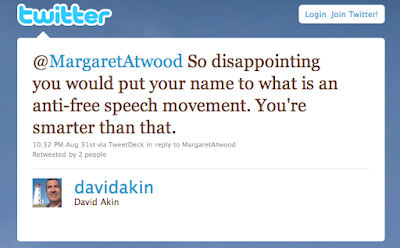Here we go again. One of the most predictable things about the radical right is the incessant obsession with stripping words of their meanings. In their through-the-looking-glass world, words can mean anything. They can be stripped of their connotations and used with no regard for context, for history or even coherence. Case in point: among our southern friends, the disciples of Karl Rove have been so successful in turning the word "liberal" into an epithet that the entire national conversation has been hijacked. (Tip of the hat to my pal Sabina for the first link; I have a little trouble believing that the second one is genuine because the spelling and grammar are almost perfect.)
This is why it's more important than ever to ensure that terms don't get redefined. I've written previously about the need to maintain control over narratives, but it's even more fundamental to make sure that when we use terms like "freedom of speech," "civil liberties" and "censorship," we're not allowing our opponents to impose their own instrumental meanings. If we're not vigilant about that, we've lost the debate before it even begins.
So, back to first principles. Let's talk about censorship for a minute. Censorship is defined by Wikipedia as "the suppression of speech or other communication which may be considered objectionable, harmful, sensitive, or inconvenient to the general body of people as determined by a government, media outlet, or other controlling body."
With great respect to my conservative friends, nobody's arguing that Sun Media and Kory Teneycke shouldn't be allowed to set up their so-called "populist" news channel, even if the premise upon which they're basing it is contrived bullshit. What I object to is the idea of the PMO strong-arming the CRTC into making sure it gets a Category 1 licence, which would require cable carriers to include it as part of their basic TV packages. Ensuring that regulatory bodies maintain an impartial arms-length separation from the government of the day and enabling them to withstand transitory political pressure is not censorship, dear friends.
It's indicative of how debased public conversation can become, however, that principled devotion to the idea of an impartial public service can be smeared with inflammatory labels like censorship. Let's be clear: "censorship" is every bit as loaded a term as "racism." Accusations of censorship or hate speech are rhetorical and emotional cudgels which have the effect of shutting down debate. And by extension, claiming that someone else is accusing of you such things allows you to claim victim status. Either way, you've moved the debate away from issues of principle and policy and reframed it in far more volatile and easily manipulated emotional terms.
Margaret Atwood's entry into the discussion has prompted exactly this sort of response. Sun Media's Ottawa bureau chief has accused her of backing an anti-free-speech movement.
Over at Let Freedom Rain, Jymn Parrett writes about the weird entitlement thing right-wingers have when it comes to the media. They really believe that the media have an obligation to parrot their own sense of grievance and outrage, he argues, and it drives them bonkers when that doesn't happen. As he puts it:
Sharron Angle so perfectly encapsulated this entitlement syndrome when she famously told a newsperson that she thinks the role of the media is to reflect her positions as she recites them. Palin and Dr. Laura also have publicly expressed this idea, confusing their rights with that of the first amendment.
Note to conservatives - the media is not here to read your minds and print your thoughts. You've been spoiled for too long listening to dittoheads on the radio waves and the dunderheads at Fox News. We are not all Murdoch. And that royally pisses off the right.It seems intuitively obvious, but when you're dealing with people who view the world through a warped ideological lens, nothing is obvious. People like Sarah Palin, Michael Savage and Laura Schlessinger have been quick to claim the mantle of victimhood and cry censorship when people call them on their hatred and stupidity, but it needs to be emphasized, and repeated as often as necessary: disagreeing with someone and holding her accountable for her irresponsible and hateful rhetoric is not censorship. Freedom of speech doesn't mean you're immune from criticism. Words have consequences.
In Politics and the English Language (1946), George Orwell argued that
... one ought to recognize that the present political chaos is connected with the decay of language, and that one can probably bring about some improvement by starting at the verbal end. If you simplify your English, you are freed from the worst follies of orthodoxy. You cannot speak any of the necessary dialects, and when you make a stupid remark its stupidity will be obvious, even to yourself.Once again, vigilance is key. If we allow them to define the words, we're letting them frame the issues and define the terms of the debate. We can't let them do that.


Orwell understood you very well.
ReplyDeleteYou are of course free to speak out that others should not be allowed to speak out, lest their thoughts "infect the National discourse" or any other impulse of yours. I am of course still free to speak out about those, like you, who advocate the suppression of speech that you dislike.
To seek the suppression of your freedom to speak? No. To describe clearly what it is you are advocating.
Now, please happily riff away on your "Freedom of Speech is for Me, not for Thee--unless what thou sayest is just fine with Me" line of attack